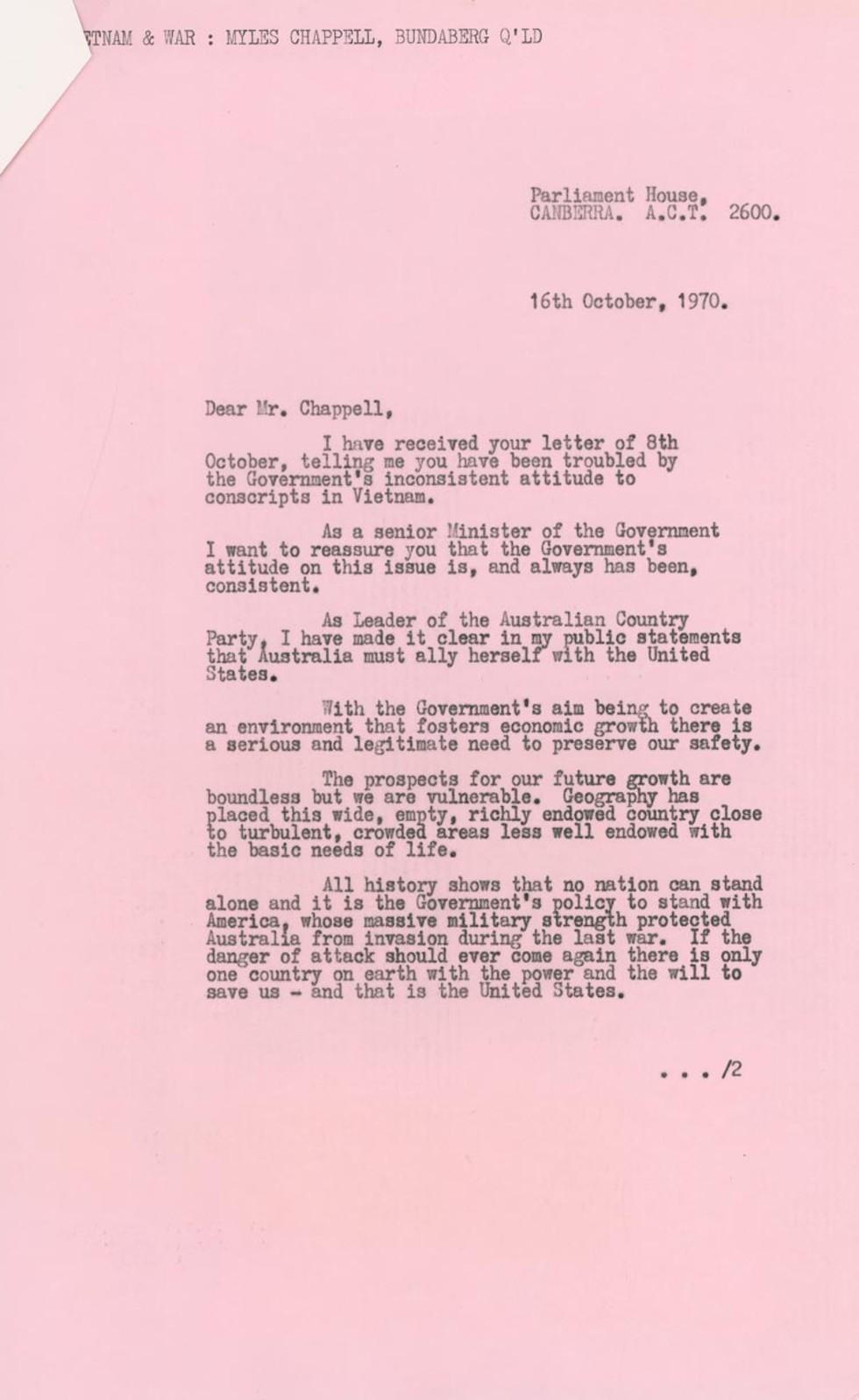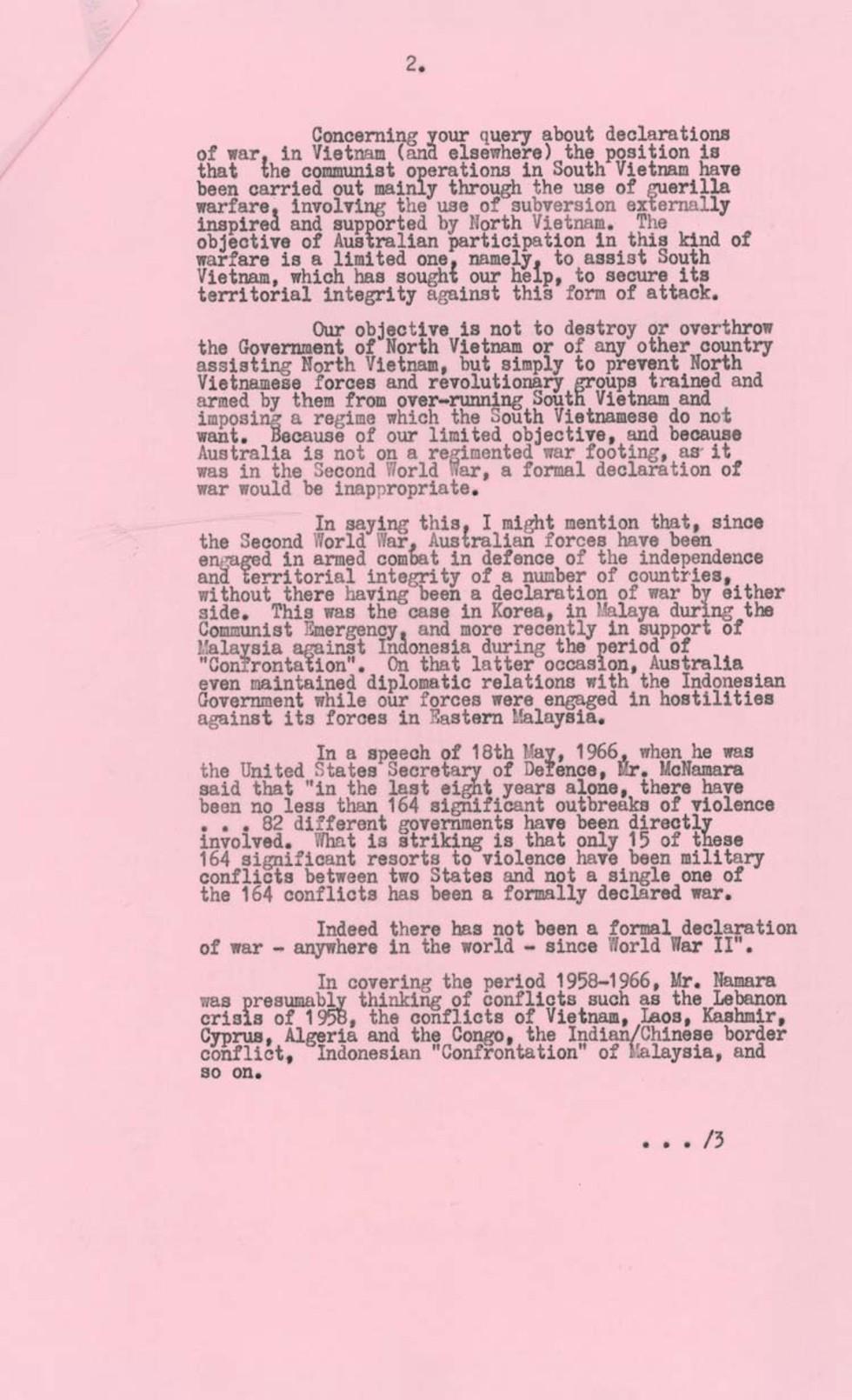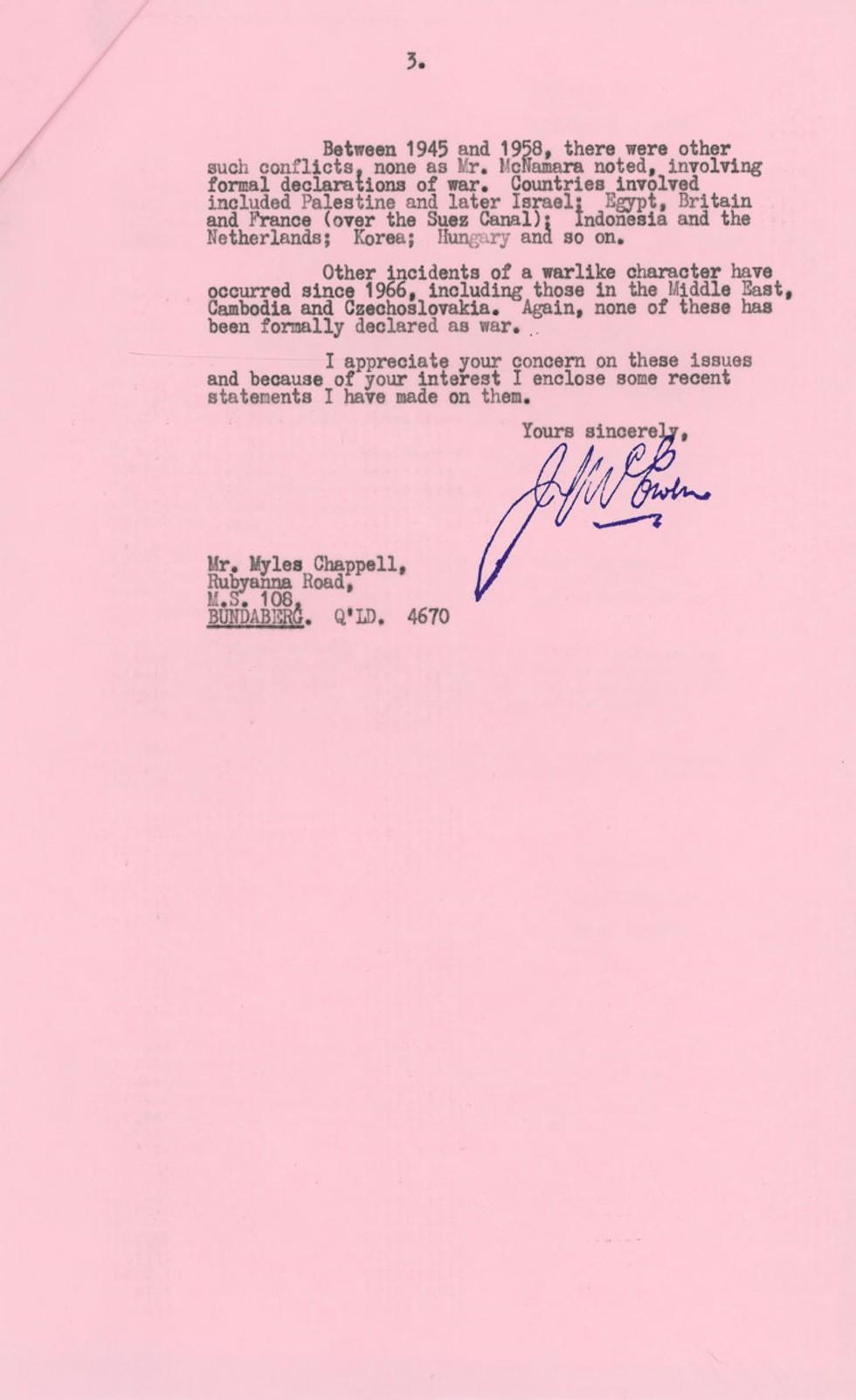


Aboriginal and Torres Strait Islander people should be aware that the National Archives' website and collection contain the names, images and voices of people who have died.
Some records include terms and views that are not appropriate today. They reflect the period in which they were created and are not the views of the National Archives.




VIETNAM & WAR: MYLES CHAPPELL, BUNDABERG Q'LD
Parliament House,
CANBERRA. A.C.T. 2600.
16th October, 1970.
Dear Mr. Chappell,
I have received your letter of 8th October, telling me you have been troubled by the Government's inconsistent attitude to conscripts in Vietnam.
As a senior Minister of the Government I want to reassure you that the Government's attitude on this issue is, and always has been, consistent.
As Leader of the Australian Country Party, I have made it clear in my public statements that Australia must ally herself with the United States.
With the Government's aim being to create an environment that fosters economic growth there is a serious and legitimate need to preserve our safety.
The prospects for our future growth are boundless but we are vulnerable. Geography has placed this wide, empty, richly endowed country close to turbulent, crowded areas less well endowed with the basic needs of life.
All history shows that no nation can stand alone and it is the Government's policy to stand with America, whose massive military strength protected Australia from invasion during the last war. If the danger of attack should ever come again there is only one country on earth with the power and the will to save us - and that is the United States.
Concerning your query about declarations of war, in Vietnam (and elsewhere) the position is that the communist operations in South Vietnam have been carried out mainly through the use of guerrilla warfare, involving the use of subversion externally inspired and supported by North Vietnam. The objective of Australian participation in this kind of warfare is a limited one, namely, to assist South Vietnam, which has sought our help, to secure its territorial integrity against this form of attack.
Our objective is not to destroy or overthrow the Government of North Vietnam or of any other country assisting North Vietnam, but simply to prevent North Vietnamese forces and revolutionary groups trained and armed by them from over-running South Vietnam and imposing a regime which the South Vietnamese do not want. Because of our limited objective, and because Australia is not on a regimented war footing, as it was in the Second World War, a formal declaration of war would be inappropriate.
In saying this, I might mention that, since the Second World War, Australian forces have been engaged in armed combat in defence of the independence and territorial integrity of a number of countries, without there having been a declaration of war by either side. This was the case in Korea, in Malaya during the Communist Emergency, and more recently in support of Malaysia against Indonesia during the period of "Confrontation". On that latter occasion, Australia even maintained diplomatic relations with the Indonesian Government while our forces were engaged in hostilities against its forces in Eastern Malaysia.
In a speech of 18th May, 1966, when he was the United States Secretary of Defence, Mr. McNamara said that "in the last eight years alone, there have been no less than 164 significant outbreaks of violence … 82 different governments have been directly involved. What is striking is that only 15 of these 164 significant resorts to violence have been military conflicts between two States and not a single one of the 164 conflicts has been a formally declared war.
Indeed there has not been a formal declaration of war – anywhere in the world – since World War II".
In covering the period 1958–1966, Mr. Namara [sic] was presumably thinking of conflicts such as the Lebanon crisis of 1958, the conflicts of Vietnam, Laos, Kashmir, Cyprus, Algeria and the Congo, the Indian/Chinese border conflict, Indonesian "Confrontation" of Malaysia, and so on.
Between 1945 and 1958, there were other such conflicts, none as Mr. McNamara noted, involving formal declarations of war. Countries involved included Palestine and later Israel; Egypt, Britain and France (over the Suez Canal); Indonesia and the Netherlands; Korea; Hungary and so on.
Other incidents of a warlike character have occurred since 1966, including those in the Middle East, Cambodia and Czechoslovakia. Again, none of these has been formally declared as war.
I appreciate your concern on these issues and because of your interest I enclose some recent statements I have made on them.
Yours sincerely,
[J McEwen signature]
Mr. Myles Chappell,
Rubyanna Road,
M.S. 108,
BUNDABERG. Q'LD. 4670
This is a typed letter from John McEwen, Country Party leader and Deputy Prime Minister, to a constituent, Myles Chappell. It responds to a letter from Chappell about Australia’s role in the Vietnam War.
The Australian government continued to maintain a strong commitment to its involvement in the Vietnam War during a time when the anti-war movement was growing.
The letter suggests that the main reason for Australia’s involvement in the Vietnam War was to strength its alliance with the United States. McEwen emphasises a popular belief that Australia needed the military strength of the United States to provide protection, as it had during World War II.
McEwen responds to Chappell’s criticism that there had been no formal declaration of war against North Vietnam by stating that the goal of the conflict was to prevent incursions into south Vietnam and was not to defeat the North Vietnam government itself.
McEwen outlines the Australian Government's commitment to the fight in Vietnam, citing links with the United States and Australia's previous role in intervening in foreign conflicts. Australia also provided military assistance to Malaya and Korea where no formal declaration of war was made.
Chappell had argued in his letter to McEwen that Australia’s policy on Vietnam was inconsistent because Australia continued to trade with communist-led China and the Soviet Union, who were the main supporters of North Vietnam. This trade arguably supplied resources to North Vietnam in their fight against Australian troops. Chappell suggests that McEwen’s policy was placing economics before the lives of Australian troops. McEwen does not address this in his reply.
John McEwen was Deputy Prime Minister, leader of the Country Party and Minister for Commerce and Trade at the time of writing this letter. Following the death of Prime Minister Harold Holt, McEwen served as Prime Minister from 19 December 1967 to 10 January 1968.
Learn how to interpret primary sources, use our collection and more.
